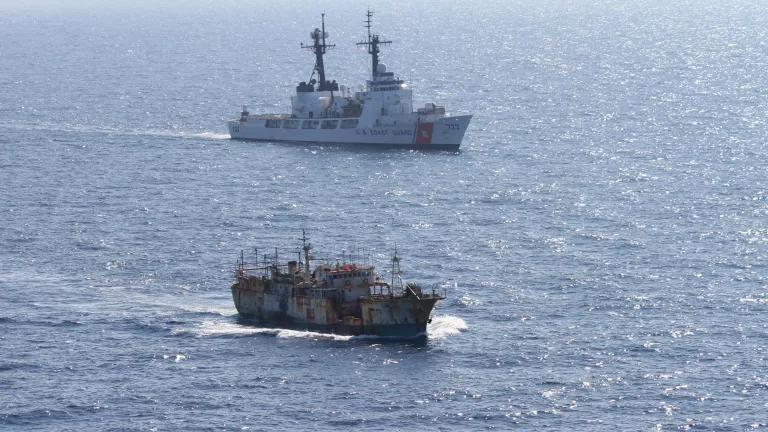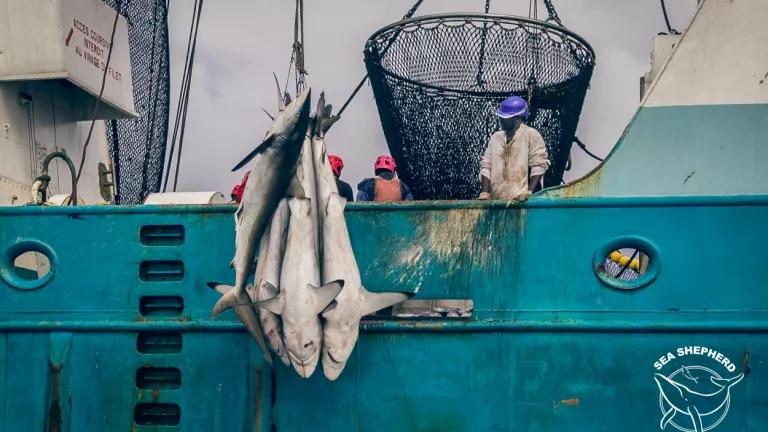Senate Passes Measures to Combat Illegal Fishing
A defense package with IUU fishing reforms is headed to the president's desk.

A Coast Guard ship following a suspected illegal drift net fishing boat in the North Pacific Ocean
U.S. Coast Guard
This year’s National Defense Authorization Act (NDAA) package, which passed the Senate late last week, included important policy reforms that will help efforts to thwart illegal fishing and forced labor in the fishing and seafood sector. This legislation makes it clear that seafood produced with forced labor should not be allowed to enter the U.S. market, and includes key improvements to the tools the U.S. government uses to screen for illegally caught seafood entering the U.S.
Illegal, unreported, and unregulated (IUU) fishing is of high national security concern and threatens the health of the billions of people who rely on healthy fisheries. In 2020, the U.S. Coast Guard declared IUU fishing as the leading maritime security threat: it contributes to the collapse and decline of global fish stocks, and not only threatens ocean health, but destabilizes economies and increases international conflict. IUU fishing is also directly tied to forced labor and human rights abuses at sea and in the seafood supply chain.
Recognizing this threat, President Biden signed a National Security Memorandum to address IUU fishing and forced labor earlier this year. This was accompanied by a series of important announcements at the UN Ocean Conference in June that stepped up the U.S. government’s commitment to tackle these intertwined crises across federal programs.
The NDAA builds on this momentum by making targeted improvements to the tools that NOAA Fisheries uses to screen for illegal seafood and enforce against imports found to be illegal–including those tainted with forced labor. This is an important recognition of the key role and responsibility of the United States as a major market for illegal seafood—nearly $2.4 billion worth of seafood imports into the U.S. in 2019 were derived from IUU fishing practices.
The final bill contains provisions that significantly expand and improve the High Seas Driftnet Act, one of the central tools NOAA has to combat IUU fishing and forced labor in international fisheries, including heightened sanctions for nations that fail to address IUU fishing, and a directive for NOAA and partner agencies to expand capacity building initiatives with source countries. The bill also provides $20 million in annual appropriations funding to support enforcement of section 307 of the Tariff Act, which bans imports of goods, including seafood, made with forced labor. Additionally, it makes improvements to NOAA’s Seafood Import Monitoring Program (SIMP) to help improve its function and enforcement as a screening tool for IUU seafood entering the U.S., while prioritizing screening for seafood produced with forced labor or human trafficking.
Watch this video from our sister organization, NRDC Action Fund, to learn more about illegal fishing.
It is thanks to ocean champions in Congress, including Chair Raúl Grijalva of the House Natural Resources Committee, Chair Maria Cantwell of the Senate Commerce Committee, and their hardworking staff, that we have these provisions on their way to becoming law. Notably, several of the provisions are based on Rep. Jared Huffman’s Illegal Fishing and Forced Labor Prevention Act (H.R. 3075, introduced as a bipartisan effort with Rep. Garret Graves), and these reforms would not be possible without the hard work and leadership demonstrated through that legislation.
While the Seafood Import Monitoring Program improvements in the NDAA are a step in the right direction, much work remains in order to stem the flow of IUU-sourced or fraudulent seafood into the United States and improve the sustainability of seafood sold in the U.S. market. Rather than incrementally incorporate new fish species into SIMP, NOAA should act quickly to bring all imported seafood under the program. Further, the United States should require use of Automatic Identification Systems (AIS) to dramatically improve transparency of global fishing operations. We look forward to continuing to work toward these important goals in the new year.
In addition to the NDAA’s illegal fishing measures, this year’s defense bill included other critical gains for ocean and marine wildlife conservation, including programs aimed at reducing the impacts of ships and other vessels on marine mammals, and a federal ban on the buying and selling of shark fins in the United States. This is a rare set of victories worth celebrating along with coastal communities and the policymakers who carried them across the finish line.





